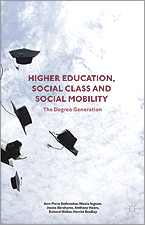
Ann-Marie Bathmaker, Nicola Ingram, Jessie Abrahams, Anthony Hoare, Richard Waller & Harriet Bradley.
Palgrave Macmillan, 2016; 188 pp;
ISBN: 978-1-13753-480-4.
by Robin Whitaker
Pop culture abounds with stories where disadvantaged kids make good through educational opportunity. Likewise, common wisdom holds university access as key to fighting inequality. Yet systematic research invariably complicates the feel-good narrative. Higher Education, Social Class and Social Mobility: The Degree Generation is no exception.
This clear, readable book documents the Paired Peers project that, beginning in 2010, followed an undergraduate cohort from entrance to graduation in two neighbouring universities: the University of Bristol (UoB) and the University of the West of England (UWE). UoB is one of Britain’s self-selected elite institutions: a founder of the Russell Group of research-intensive universities that also includes Cambridge and Oxford. In contrast, UWE, a polytechnic-turned-comprehensive-university under the 1992 expansion of the UK university system, emphasises applied research and vocational programs. To assess the effects of class background on undergraduate life with an eye to big-picture questions about social mobility, the researchers recruited pairs of working- and middle-class students from 11 disciplines at each university (90 in total; 70 completed the study).
Early chapters provide broad context for the research. Expanded university access in the UK produced the “degree generation” of the book’s title even as the cost of university shifted to individuals through major fee increases and the replacement of means-tested grants with student loans. Unsurprisingly, this has encouraged students and universities alike to view education as a commodity. Hierarchy continues to suffuse British education. To give just one marker: at UoB, 40 per cent of students were privately educated; at UWE, 93 per cent came from state schools.
Three chapters on students’ own journeys bring these broad patterns to life. Thus, middle-class kids reported always knowing they would go to university; the real question was where. Faced with a roadblock, middle-class parents used their institutional knowledge to fix things, just as they coached their kids to “play the system” to advantage, with an eye to getting into an elite university. For working-class students in contrast, going to university was often a marked choice, with parents giving encouragement rather than guidance.
Once there, working-class students found themselves lacking resources needed to make university a ready vehicle for social mobility. Financial constraints and a lack of professional networks limited access to extra-curricular activities and unpaid internships. Working-class students said their parents wanted to help but lacked the requisite knowledge and connections.
Middle-class students who felt out of place at UWE and working-class students who felt like interlopers at UoB both adapted to an alien environment. The former mobilized social and cultural capital acquired during childhood to compensate for not attending an elite institution. The latter focused on the independence and resilience that got them to a high-ranking university despite the odds.
And that is the crux of it. Indeed, the more people get them, the more “a degree is not enough.” (96) “CV development” for employability often requires activities that working-class students struggle to access. Stratification among universities has intensified, with Russell Group students forming an elite tier against which everyone else is judged inferior. That a few non-privileged students manage to get in sustains the illusion of “meritocratic selection” (151), legitimating increased inequality — although in these neoliberal times, for middle-class kids, university may serve mainly to stave off downward mobility.
Clearly, universities alone cannot eliminate structural inequality. Still, this book offers suggestions for mitigating it on both individual and systemic levels. On the latter, Canadians should pay special heed to the dangers posed by tuition hikes and attempts to establish exclusive university groupings with disproportionate claims on public resources.
Robin Whitaker is an associate professor of anthropology at Memorial University of Newfoundland.